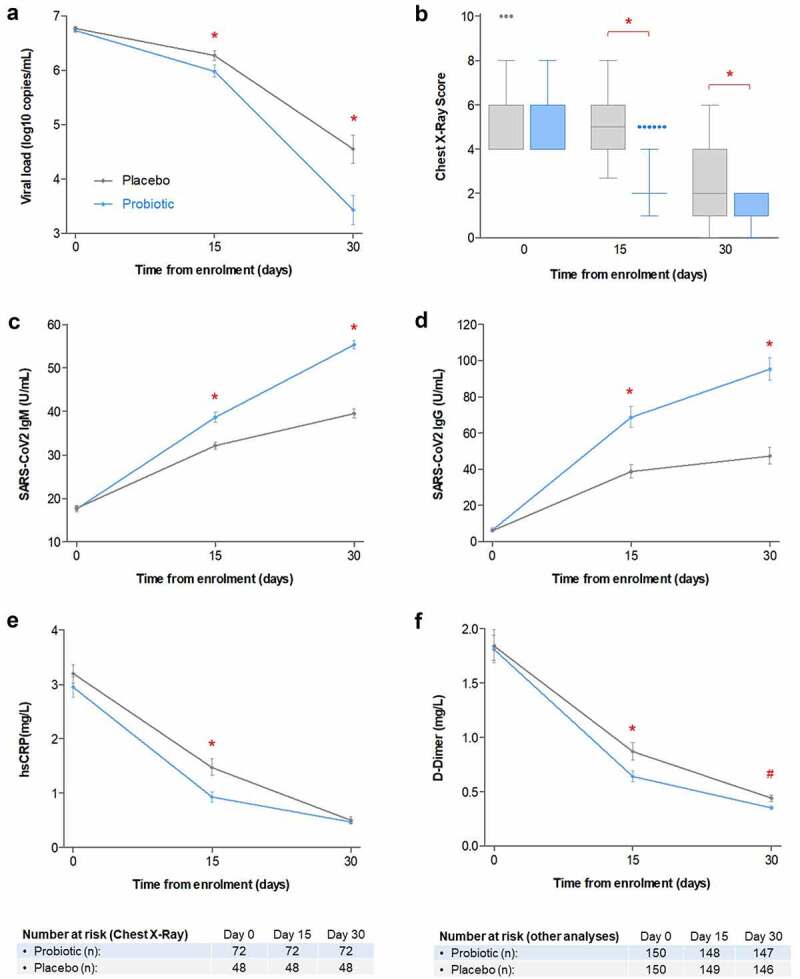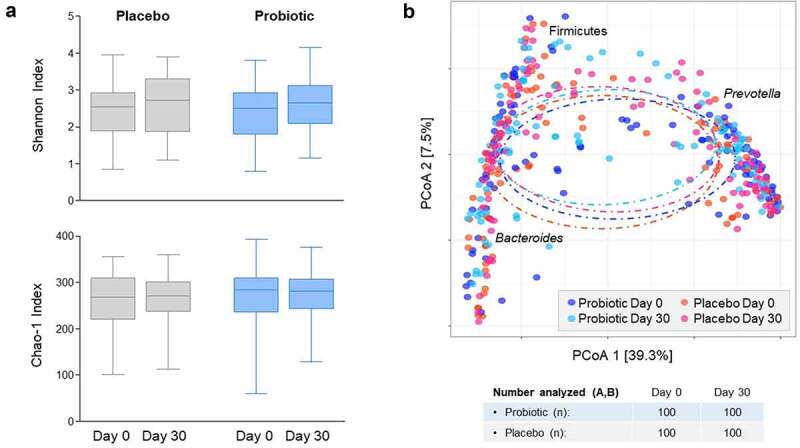rapidboson
Senior Member (Voting Rights)
Probiotic improves symptomatic and viral clearance in Covid19 outpatients: a randomized, quadruple-blinded, placebo-controlled trial
2022 study
ABSTRACT
Intestinal bacteria may influence lung homeostasis via the gut-lung axis. We conducted a single-center, quadruple-blinded, randomized trial in adult symptomatic Coronavirus Disease 2019 (Covid19) outpatients. Subjects were allocated 1:1 to probiotic formula (strains Lactiplantibacillus plantarum KABP022, KABP023, and KAPB033, plus strain Pediococcus acidilactici KABP021, totaling 2 × 109 colony-forming units (CFU)) or placebo, for 30 days.
Co-primary endpoints included: i) proportion of patients in complete symptomatic and viral remission; ii) proportion progressing to moderate or severe disease with hospitalization, or death; and iii) days on Intensive Care Unit (ICU).
Three hundred subjects were randomized (median age 37.0 years [range 18 to 60], 161 [53.7%] women, 126 [42.0%] having known metabolic risk factors), and 293 completed the study (97.7%).
Complete remission (i.e. complete symptomatic and viral clearance*) on day 30 was achieved by 78 of 147 (53.1%) in probiotic group compared to 41 of 146 (28.1%) in placebo (RR: 1.89 [95 CI 1.40–2.55]; P < .001), significant after multiplicity correction. No hospitalizations or deaths occurred during the study, precluding the assessment of remaining co-primary outcomes.
Probiotic supplementation was well-tolerated and reduced nasopharyngeal viral load, lung infiltrates and duration of both digestive and non-digestive symptoms, compared to placebo.
No significant compositional changes were detected in fecal microbiota between probiotic and placebo, but probiotic supplementation significantly increased specific IgM and IgG against Severe Acute Respiratory Syndrome Coronavirus 2 (SARS-CoV2) compared to placebo.
It is thus hypothesized this probiotic primarily acts by interacting with the host’s immune system rather than changing colonic microbiota composition. Future studies should replicate these findings and elucidate its mechanism of action (Registration: NCT04517422).
*Requires negative RT-qPCR (viral clearance) plus complete resolution of all five Covid19 symptoms considered at study entry (symptomatic clearance).
LINK PDF
2022 study
ABSTRACT
Intestinal bacteria may influence lung homeostasis via the gut-lung axis. We conducted a single-center, quadruple-blinded, randomized trial in adult symptomatic Coronavirus Disease 2019 (Covid19) outpatients. Subjects were allocated 1:1 to probiotic formula (strains Lactiplantibacillus plantarum KABP022, KABP023, and KAPB033, plus strain Pediococcus acidilactici KABP021, totaling 2 × 109 colony-forming units (CFU)) or placebo, for 30 days.
Co-primary endpoints included: i) proportion of patients in complete symptomatic and viral remission; ii) proportion progressing to moderate or severe disease with hospitalization, or death; and iii) days on Intensive Care Unit (ICU).
Three hundred subjects were randomized (median age 37.0 years [range 18 to 60], 161 [53.7%] women, 126 [42.0%] having known metabolic risk factors), and 293 completed the study (97.7%).
Complete remission (i.e. complete symptomatic and viral clearance*) on day 30 was achieved by 78 of 147 (53.1%) in probiotic group compared to 41 of 146 (28.1%) in placebo (RR: 1.89 [95 CI 1.40–2.55]; P < .001), significant after multiplicity correction. No hospitalizations or deaths occurred during the study, precluding the assessment of remaining co-primary outcomes.
Probiotic supplementation was well-tolerated and reduced nasopharyngeal viral load, lung infiltrates and duration of both digestive and non-digestive symptoms, compared to placebo.
No significant compositional changes were detected in fecal microbiota between probiotic and placebo, but probiotic supplementation significantly increased specific IgM and IgG against Severe Acute Respiratory Syndrome Coronavirus 2 (SARS-CoV2) compared to placebo.
It is thus hypothesized this probiotic primarily acts by interacting with the host’s immune system rather than changing colonic microbiota composition. Future studies should replicate these findings and elucidate its mechanism of action (Registration: NCT04517422).
*Requires negative RT-qPCR (viral clearance) plus complete resolution of all five Covid19 symptoms considered at study entry (symptomatic clearance).
LINK PDF
Last edited by a moderator:




